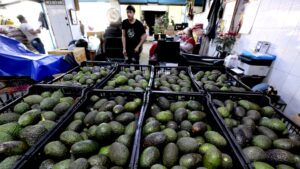Chipotle’s Resilience Amid Potential Tariff Changes: What Investors Need to Know
As the world continues to navigate economic uncertainties and shifting trade policies, investors are keenly observing major players in the restaurant industry. At the recent earnings call, Chipotle Mexican Grill provided insights that should excite both food enthusiasts and investors alike. Following President Trump’s recent suspension of proposed tariffs on Mexican and Canadian imports, Chipotle executives reassured stakeholders about their capacity to manage costs effectively, especially regarding their avocado supply.
Understanding Chipotle’s Supply Chain
While the fear of rising costs from tariffs is palpable, it’s essential to recognize that Chipotle is strategically positioned to weather these challenges. Currently, about 50% of Chipotle’s avocados are sourced from Mexico, while the remainder comes from other countries like Colombia, Peru, and the Dominican Republic. This diverse sourcing strategy significantly mitigates the risk associated with potential tariffs on Mexican imports.
According to Chief Financial Officer Adam Rymer, even if tariffs were enacted, the expected rise in their cost of sales would only be around 0.6 percentage points. With less than 2% of their overall sales linked directly to imports from Mexico, Chipotle has effectively insulated itself from drastic price adjustments that could impact other restaurants relying heavily on these imports.
Market Dynamics: A Strong Quarter
In the last quarter, Chipotle displayed impressive performance, reporting a same-store sales growth of 5.4%, propelled by a 4% increase in traffic—a clear indication that consumers are not shying away from dining out, even amid economic pressures. This resilience can be attributed not only to their culinary offerings but also to their strategic pricing power, allowing them to adapt to the market while maintaining customer loyalty.
Despite facing a decline in share prices by 5% due to conservative forecasts for future sales growth, the foundation remains strong. The company’s ability to maintain quality while managing costs aligns perfectly with current consumer trends favoring value without sacrificing flavor.
The Bigger Picture: Tariffs and the Restaurant Industry
As the possibility of tariffs looms, it is crucial for investors to understand the broader implications. The potential for increased costs on ingredients like avocados and beef could ripple through the entire restaurant sector. However, Chipotle’s proactive measures in sourcing and pricing strategy highlight a positive trajectory that could serve as a model for other brands.
Moreover, the past few years have seen Chipotle invest in enhancing its supply chain and ingredient quality, promising freshness which is a significant part of their brand identity. This approach not only secures their ingredient costs but also builds customer trust—critical elements in today’s competitive environment.
Conclusion: Why Chipotle Stands Out
For investors looking to gauge the resilience of the restaurant industry, Chipotle offers a compelling narrative. The company’s effective sourcing strategies, ability to adapt to pricing pressures, and ongoing adjustments to consumer demand underscore a robust operational framework. As they navigate the complexities of tariffs and global supply chains, the lessons from Chipotle could provide valuable insights into managing uncertainty in the market.
In summary, Chipotle isn’t just about delicious avocados but a well-rounded business strategy that appeals to value-conscious diners while assuring investors of sustainable growth. At Extreme Investor Network, we’re committed to analyzing market trends and providing actionable insights to empower our readers. Stay tuned for more updates as we continue to track key developments in the business landscape.

